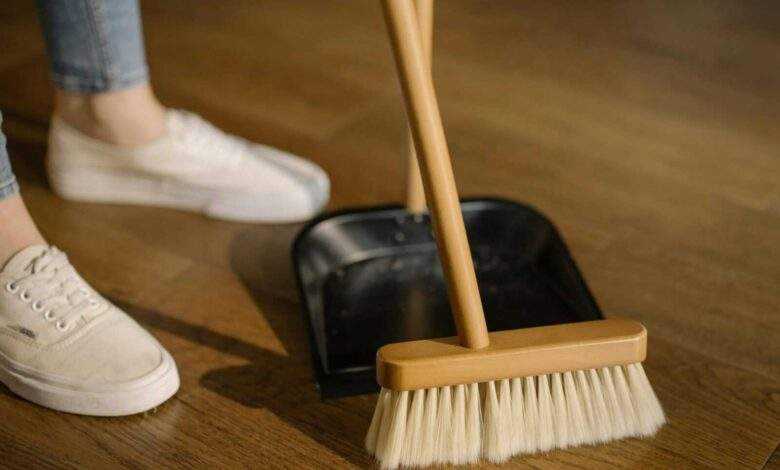Sustainable Home Cleaning on a Budget: Natural Ingredients and Affordable Tools

Table of Contents
Sustainable home cleaning is an increasingly popular approach that focuses on using natural ingredients and budget-friendly tools to maintain a clean and healthy living environment. This method offers numerous advantages, including reduced exposure to harsh chemicals, decreased environmental impact, and significant cost savings. By opting for eco-friendly cleaning products and adopting natural cleaning solutions, households can create a safer and more sustainable cleaning routine.
One of the primary benefits of sustainable home cleaning is the reduction of chemical exposure. Many conventional cleaning products contain harmful substances that can pose risks to both human health and the environment. By switching to non-toxic cleaning solutions, such as homemade cleaning products for allergies or DIY cleaning with vinegar, individuals can minimize their contact with these dangerous chemicals. This not only promotes better indoor air quality but also helps in protecting vulnerable family members, including children and pets.
In addition to health benefits, sustainable home cleaning is also environmentally friendly. Traditional cleaning products often contribute to water pollution and generate significant amounts of plastic waste. By choosing green cleaning on a budget, such as reusable cleaning cloths or microfiber cleaning cloths, households can significantly reduce their ecological footprint. Natural cleaning recipes that utilize common household items, like baking soda and lemon juice, further contribute to an eco-friendly cleaning routine.
Moreover, sustainable home cleaning is an economical choice. Many natural ingredients used in DIY cleaning products are inexpensive and readily available. For example, vinegar and baking soda are cost-effective alternatives to commercial cleaning agents. Adopting budget-friendly cleaning supplies can result in substantial savings over time. Additionally, the best essential oils for cleaning, such as tea tree oil and lavender oil, not only boost cleaning efficacy but also provide pleasant scents without the need for artificial fragrances.
Overall, sustainable home cleaning is a practical and affordable approach that benefits both the household and the environment. By embracing this method, individuals can enjoy a cleaner, healthier living space while also contributing to a more sustainable future. The following sections will delve deeper into specific techniques and tools that can help you achieve an eco-friendly and budget-friendly cleaning routine.
Natural Cleaning Solutions for Bathrooms
Creating a sustainable home cleaning routine for your bathroom can be both effective and budget-friendly when using natural ingredients such as baking soda, vinegar, and lemon juice. These common household items offer powerful cleaning capabilities without the harsh chemicals found in many commercial products. Here, we explore specific recipes and methods for maintaining a sparkling clean bathroom.
Sinks and Faucets: Baking soda is an excellent abrasive cleaner that can remove grime and stains from sinks and faucets. Simply sprinkle baking soda over the surface and scrub with a damp cloth or sponge. For added shine and to tackle water spots, spray a mixture of equal parts vinegar and water, let it sit for a few minutes, and then rinse thoroughly.
Bathtubs and Showers: Soap scum and mildew are common issues in bathtubs and showers. A paste made from baking soda and water can effectively scrub away soap scum. Apply the paste, let it sit for 15 minutes, then scrub with a brush and rinse. For mildew, spray undiluted white vinegar directly onto the affected areas, leave it for an hour, and then wipe clean. The acidity of vinegar helps to kill mold spores and prevent further growth.
Toilets: To clean and deodorize toilets, pour a cup of baking soda into the bowl, followed by a cup of vinegar. The fizzing action helps to break down stains and disinfect the surface. Scrub with a toilet brush and flush for a sparkling clean result. For tough stains, leave the mixture in the bowl overnight before scrubbing.
Tiles and Grout: Lemon juice, with its natural bleaching properties, can be used to clean tiles and grout. Mix lemon juice with baking soda to form a paste, apply it to the grout lines, and scrub with a toothbrush. Rinse with water and wipe dry. This method not only whitens grout but also leaves a fresh citrus scent.
By incorporating these natural cleaning solutions into your eco-friendly cleaning routine, you can effectively maintain your bathroom’s cleanliness while staying environmentally conscious and budget-friendly. Utilizing homemade cleaning products for allergy-prone individuals also reduces exposure to potential irritants found in conventional cleaners, making it a healthier choice for your household.
DIY Glass Cleaner with Vinegar
Creating a DIY glass cleaner using vinegar is both cost-effective and environmentally friendly. This natural cleaning solution can be prepared with just a few simple ingredients: vinegar, water, and optional essential oils. Not only is this mixture easy to make, but it also rivals commercial glass cleaners in both cost and effectiveness.
To start, gather your ingredients. You will need one cup of distilled white vinegar, one cup of water, and a few drops of your favorite essential oil, such as lemon or lavender, to add a pleasant scent. Essential oils are optional but can enhance the cleaning power and provide a fresh aroma.
Here are the step-by-step instructions to make your DIY glass cleaner:
1. In a spray bottle, combine one cup of distilled white vinegar and one cup of water.2. Add 5-10 drops of essential oil, if desired. Essential oils like lemon, tea tree, or lavender are particularly effective for cleaning.3. Shake the bottle gently to mix the ingredients thoroughly.
Your eco-friendly glass cleaner is now ready to use. To apply the solution, spray it directly onto windows, mirrors, or other glass surfaces. Use a reusable cleaning cloth or microfiber cleaning cloth to wipe the surface, ensuring it is streak-free and sparkling clean. These cloths are not only effective but also reduce waste, aligning with sustainable cleaning practices.
Vinegar’s acidic nature makes it an excellent natural cleaner that can easily cut through grime and grease. It is a non-toxic cleaning solution that is safe for both the environment and your household. Compared to commercial glass cleaners, this DIY alternative is significantly more budget-friendly. Commercial products often contain harsh chemicals and come with higher price tags, while vinegar is inexpensive and readily available.
In terms of effectiveness, vinegar-based cleaners perform exceptionally well, leaving glass surfaces clear and streak-free. This simple yet powerful solution demonstrates that green cleaning on a budget is entirely feasible, providing a healthier and more sustainable option for maintaining a clean home.
Eco-Friendly Laundry Detergent Recipe
Creating an eco-friendly laundry detergent at home is a straightforward and budget-friendly way to reduce chemical exposure and embrace a more sustainable home cleaning routine. By using natural ingredients, you can ensure that your laundry is both effective and gentle on the environment. One popular recipe involves a combination of washing soda, borax, and castile soap.
To make your own eco-friendly laundry detergent, you will need the following ingredients:
- 1 cup of washing soda
- 1 cup of borax
- 1 bar of castile soap (grated) or 1 cup of liquid castile soap
Instructions:
- In a large bowl, mix the washing soda and borax.
- Add the grated or liquid castile soap to the mixture and stir until well combined.
- Transfer the mixture to an airtight container for storage.
To use, add about 1-2 tablespoons of the detergent to your washing machine per load of laundry. This recipe is safe for both regular and high-efficiency washers.
There are several benefits to using homemade laundry detergent. First and foremost, it reduces your exposure to harsh chemicals found in many commercial detergents, which is particularly beneficial for those with sensitive skin or allergies. Additionally, making your own detergent can lead to significant cost savings over time, as the natural ingredients are generally more affordable than their commercial counterparts.
For those with specific laundry needs, such as sensitive skin or heavy stains, consider adjusting the recipe accordingly. For sensitive skin, you may want to reduce the amount of washing soda or borax and increase the amount of castile soap. For tackling heavy stains, adding a bit of baking soda to the wash can boost the detergent’s cleaning power.
When storing your homemade detergent, ensure it is kept in a cool, dry place and in an airtight container to maintain its efficacy. By adopting these simple practices, you can contribute to green cleaning on a budget while maintaining an eco-friendly cleaning routine.
Clean Carpets Naturally
Maintaining clean carpets is essential for a healthy home, and it can be achieved effectively using natural cleaning solutions. One of the simplest and most effective methods involves the use of baking soda, cornstarch, and essential oils. These ingredients offer a powerful, eco-friendly cleaning solution that is gentle on your carpets and beneficial for the indoor environment.
For spot cleaning, start by mixing equal parts of baking soda and cornstarch. Sprinkle the mixture over the stained area and let it sit for about 30 minutes. This combination works to absorb moisture and lift stains. Afterward, vacuum the area thoroughly. For tougher stains, you can add a few drops of essential oils such as tea tree or lavender, known for their antibacterial properties, to the mixture before applying it to the carpet.
Deodorizing carpets can be achieved with a simple method using baking soda. Sprinkle a generous amount of baking soda over the entire carpet and leave it overnight, allowing it to absorb odors. The next day, vacuum up the baking soda to reveal a fresher smelling carpet. Essential oils can also be added to the baking soda before application to impart a pleasant fragrance and additional antibacterial benefits.
Deep cleaning carpets naturally involves the use of a mixture of white vinegar and water. In a spray bottle, combine equal parts of white vinegar and water. Lightly spray the carpet with the solution, taking care not to saturate it. Vinegar is effective at breaking down grime and neutralizing odors. Allow the carpet to dry completely before vacuuming it thoroughly. For enhanced cleaning power, add a few drops of essential oils like eucalyptus or peppermint.
These natural cleaning methods not only ensure a cleaner carpet but also contribute to improved indoor air quality by eliminating the need for harsh chemicals. Additionally, using eco-friendly cleaning products reduces environmental impact. By incorporating these simple, budget-friendly cleaning supplies and techniques into your routine, you can maintain a healthy, sustainable home.
Best Essential Oils for Mold and Mildew
Combating mold and mildew effectively can be achieved through the use of specific essential oils, which are not only potent but also eco-friendly. Tea tree oil, eucalyptus oil, and lavender oil are among the most effective natural cleaning solutions for this purpose.
Tea tree oil is renowned for its powerful antifungal and antimicrobial properties, making it an excellent choice for tackling mold and mildew. To use tea tree oil, mix one teaspoon with one cup of water in a spray bottle. Spray the mixture onto the affected area, let it sit for at least an hour, and then wipe it clean with a reusable cleaning cloth or microfiber cleaning cloth. This natural cleaning solution can help prevent mold spores from returning.
Eucalyptus oil also possesses strong antifungal properties. It can be used similarly to tea tree oil. Combine ten drops of eucalyptus oil with a cup of water, and apply it to moldy surfaces. The pleasant scent of eucalyptus oil not only leaves your home smelling fresh but also helps in maintaining an eco-friendly cleaning routine. Additionally, eucalyptus oil is known for its ability to improve respiratory health, making it a great choice for homemade cleaning products for allergies.
Lavender oil is another effective essential oil for mold and mildew due to its antifungal and antiseptic characteristics. Apart from its cleaning prowess, lavender oil is favored for its soothing aroma, adding a calming effect to your living space. Mix ten drops of lavender oil with a cup of white vinegar, a popular ingredient in DIY cleaning with vinegar, and use it as a spray on mold-prone areas. This eco-friendly cleaning hack ensures a fresh and mold-free environment.
Using essential oils in your cleaning routine not only addresses mold and mildew issues but also introduces a natural, non-toxic approach to home cleaning. These eco-friendly cleaning products are budget-friendly and enhance your home’s ambiance with their pleasant scents while providing additional antimicrobial benefits. Incorporating essential oils into your cleaning regimen is a sustainable way to maintain a healthy, mold-free home.
Where to Buy Reusable Cleaning Cloths
Finding affordable and sustainable options for reusable cleaning cloths is essential for anyone committed to eco-friendly cleaning routines. Fortunately, there are various sources where you can acquire these budget-friendly cleaning supplies. Online marketplaces such as Amazon, Etsy, and specialized eco-friendly stores offer a wide range of reusable cleaning cloths, including microfiber cleaning cloths known for their durability and effectiveness. Local eco-friendly shops also provide an excellent selection of natural cleaning solutions, often featuring products from local artisans and small businesses, which can be a great way to support your community.
Moreover, DIY cleaning products enthusiasts can create their own reusable cleaning cloths from materials at home. Old cotton t-shirts, towels, or any soft fabric can be cut into cloth-sized pieces and used for cleaning. This not only saves money but also reduces waste by repurposing items that would otherwise be discarded.
The benefits of using reusable cleaning cloths over disposable ones are numerous. Reusable cloths significantly reduce household waste, thus contributing to a more sustainable home cleaning approach. They are also cost-effective in the long run, as they can be washed and reused multiple times, unlike disposable cloths which need to be frequently repurchased. When maintained properly, these cloths can last for years, making them an economical and environmentally friendly choice.
To extend the lifespan of your reusable cleaning cloths, proper maintenance is crucial. Wash them regularly in hot water to remove dirt and bacteria. Avoid using fabric softeners, as they can leave residues that reduce the cloths’ absorbency. Air drying is preferable, but if you use a dryer, ensure it’s set on a low heat setting to prevent damage. By following these maintenance tips, you can maximize the efficiency and longevity of your reusable cleaning cloths, making your eco-friendly cleaning routine even more sustainable.
Creating a Sustainable Cleaning Routine
We’ve journeyed through the essentials of sustainable home cleaning, emphasizing the importance of using natural ingredients and affordable tools. By incorporating eco-friendly cleaning products and DIY cleaning solutions, you can significantly reduce your environmental footprint while maintaining a clean and healthy living space. The use of natural cleaning recipes, such as those involving vinegar and essential oils, not only ensures a non-toxic environment but also caters to specific needs like allergies.
Adopting green cleaning on a budget is achievable with budget-friendly cleaning supplies and simple eco-friendly cleaning hacks. For instance, reusable cleaning cloths and microfiber cleaning cloths are both cost-effective and sustainable alternatives to disposable options. These practices not only contribute to environmental conservation but also offer long-term financial savings.
Implementing an eco-friendly cleaning routine requires consistency and commitment. By integrating these sustainable methods into your daily habits, you can enhance the overall cleanliness of your home while promoting better health for you and your family. The use of homemade cleaning products, such as those crafted from basic household ingredients, eliminates exposure to harmful chemicals, thereby improving indoor air quality and reducing the risk of health issues.
Incorporating the best essential oils for cleaning, such as lemon, tea tree, and lavender, can elevate your cleaning experience with their natural disinfectant properties and pleasant aromas. Sustainable cleaning is not just a trend; it’s a lifestyle choice that brings myriad benefits. By making small, consistent changes, you can contribute to a healthier planet, enjoy cost savings, and ensure a safer home environment.
We encourage you to adopt the tips and recipes provided in this blog post to create your own eco-friendly cleaning routines. The long-term benefits of sustainable cleaning are undeniable, offering an enriching blend of economic, health, and environmental rewards. Start your journey towards a more sustainable home today!
Sustainable Home Cleaning on a Budget: FAQ
This FAQ tackles common questions about natural cleaning solutions and affordable tools, empowering you to create a sparkling clean home without breaking the bank or harming the environment.
1. Are natural cleaning solutions really effective?
Absolutely! Simple ingredients like vinegar, baking soda, and lemon juice can tackle a variety of cleaning tasks. For tougher jobs, consider adding essential oils with natural cleaning properties.
2. What are some of the benefits of using natural cleaning products?
- Safer for your family and pets: Free from harsh chemicals often found in commercial cleaners.
- Better for the environment: Biodegradable ingredients minimize environmental impact.
- Cost-effective: Utilize common household items and avoid purchasing expensive cleaners.
- Hypoallergenic: Ideal for those with allergies or sensitivities to chemical fragrances.
3. What are some essential ingredients for DIY cleaning solutions?
- White vinegar: A powerful disinfectant and degreaser.
- Baking soda: A natural deodorizer and gentle abrasive.
- Lemon juice: A natural bleach and disinfectant.
- Castile soap: A versatile cleaning agent for all-purpose cleaners and dish soap.
- Essential oils: Offer natural cleaning properties and pleasant scents (optional).
4. What are some budget-friendly cleaning tools I can use?
- Microfiber cloths: Reusable and highly effective for most cleaning tasks.
- Spray bottles: Repurpose old spray bottles for homemade cleaning solutions.
- Sponges: Opt for natural sponges that are biodegradable.
- Bristle brushes: Perfect for scrubbing floors, grout, and stains.
- Discarded rags: Cut up old towels or clothes for reusable cleaning cloths.
5. I’m not crafty. Do I have to make all my own cleaning solutions?
No! There are many affordable, eco-friendly cleaning products available commercially. Look for brands committed to sustainability and natural ingredients.
6. Where can I find recipes for natural cleaning solutions?
Online resources abound! Websites and social media accounts dedicated to green cleaning offer a wealth of recipes for tackling various cleaning tasks.
7. How can I create a sustainable cleaning routine?
- Clean regularly to prevent dirt and grime buildup.
- Tackle spills immediately for easier cleaning.
- Utilize microfiber cloths and reusable tools to minimize waste.
- Store cleaning solutions in labeled, repurposed containers.
8. Is sustainable cleaning more time-consuming?
Not necessarily! Many natural cleaning solutions are just as effective as commercial products. The time savings from avoiding trips to the store can offset any additional prep time.
9. What about disinfecting surfaces? Can natural solutions work?
Yes! Vinegar and diluted essential oils like tea tree oil offer natural disinfecting properties. For high-risk situations, consider commercially available disinfectants with minimal environmental impact.
10. I’m ready to embrace sustainable cleaning! What’s the first step?
Start by gathering basic supplies like vinegar, baking soda, and a spray bottle. Find a simple recipe for an all-purpose cleaner and give it a try! The satisfaction of creating an effective cleaning solution with minimal cost and environmental impact is just the beginning of your sustainable cleaning journey.








